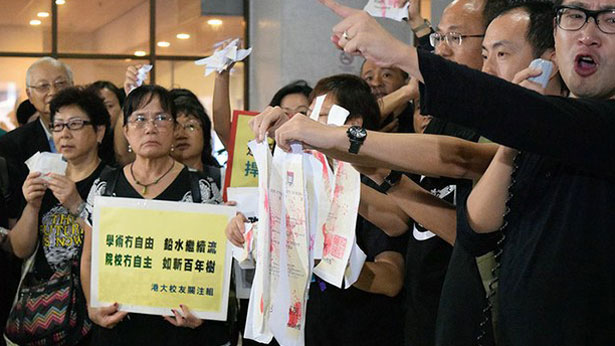Hong Kong's academic freedom 'under threat' since democracy movement
| Publisher | Radio Free Asia |
| Publication Date | 23 January 2018 |
| Cite as | Radio Free Asia, Hong Kong's academic freedom 'under threat' since democracy movement, 23 January 2018, available at: https://www.refworld.org/docid/5a94283fa.html [accessed 8 June 2023] |
| Disclaimer | This is not a UNHCR publication. UNHCR is not responsible for, nor does it necessarily endorse, its content. Any views expressed are solely those of the author or publisher and do not necessarily reflect those of UNHCR, the United Nations or its Member States. |
2018-01-23
 Hong Kong University (HKU) alumni look on as current students protest a university committee's decision to reject law professor and rights activist Johannes Chan for a top leadership post, Oct. 4, 2015. RFA
Hong Kong University (HKU) alumni look on as current students protest a university committee's decision to reject law professor and rights activist Johannes Chan for a top leadership post, Oct. 4, 2015. RFA
Academic freedom in Hong Kong is under threat from a politicized backlash from university leaders in the wake of the 2014 Occupy Central movement for universal suffrage, a rights group said as the U.K. parliament geared up to debate human rights in the former British colony, two decades after it was handed back to China.
"The state of academic freedom in Hong Kong is . . . is alive, and generally well, but only due to constant public vigilance against growing threats," rights group Hong Kong Watch said in a report published this week.
It said university management teams appear to be in the process of an ideological clampdown on Hong Kong's campus in the wake of the Occupy movement, which was largely led by the city's students.
"A growing top-down backlash has attempted to limit academic freedom and bring academia under the authorities' control," the report's author Macquarie University lecturer and expert on Hong Kong Kevin Carrico wrote.
"Although academic work in Hong Kong remains considerably freer than in the rest of the People's Republic of China, these trends suggest that elements of academic control in place elsewhere in China are gradually being incorporated into the Hong Kong system," Carrico wrote.
He cited the removal of "controversial academic figures" from their posts, or obstacles to their promotion to leadership roles, as in the case of outspoken legal professor Johannes Chan, who was passed over for the role of pro-vice-chancellor in spite of being highly recommended by a selection committee.
Carrico said such moves were "driven by political motivations."
Large mobilization by Beijing
He called for active monitoring by rights groups and the abolition of the city's chief executive's role as chancellor of all the city's universities.
"There is a growing push to place limits on freedom of speech, without any legal basis," Carrico wrote, blaming a "larger mobilization by the government of China and pro establishment figures to exercise greater control over Hong Kong politics and society."
Such moves are in breach of Hong Kong's mini-constitution, the Basic Law, and the 1984 Sino-British Joint Declaration.
While China last year dismissed the Joint Declaration as a "historical document," U.K. lawmakers said, ahead of a debate on the state of Hong Kong on Tuesday, that it is a binding bilateral treaty registered at the United Nations, and that the U.K. has a duty to ensure Beijing honors it.
Carrico also hit out at comments made by Hong Kong's two most recent chief executives, incumbent Carrie Lam and Leung Chun-ying.
"[Leung and Lam] have made comments that demonstrate insufficient dedication and even hostility to the academic freedom and freedom of speech central to academic inquiry in Hong Kong," Carrico's report found.
"This issue of accountability extends further into university councils, some of which have become politicized and seemingly accountable primarily to the Chief Executive," he said.
He cited Leung's public criticism of the Hong Kong University's journal Undergrad for its discussion of the idea of independence for the city in the wake of the failure of the Occupy Central movement to achieve its goal of fully democratic elections.
'Hong Kong Independence Research Society'
Such comments were directly linked to the later removal of directly elected lawmakers from office after they held up signs saying "Hong Kong is not China" during their swearing-in at the city's Legislative Council, Carrico said.
Ten of the city's universities also issued a joint statement last September denouncing "recent abuses" of freedom of speech, and asserting that "all universities undersigned agree that we do not support Hong Kong independence, which contravenes the Basic Law."
"Freedom of expression is not absolute, and like all freedoms it comes with responsibilities," the statement said.
The report came just days after students at the Chinese University of Hong Kong set up a study group titled the "Hong Kong Independence Research Society," prompting the university authorities to issue another statement opposing independence.
The group says it will defend students' freedom of speech and organize events to nurture a sense of Hong Kong identity among students.
Ernie Chow, head of the student union at the Chinese University of Hong Kong, said universities should be places where free debate can take place on matters of concern to society.
"Hong Kong independence doesn't breach the Basic Law, but even if it did, it wouldn't give rise to any kind of criminal or democratic responsibility," Chow told RFA in a recent interview. "Since ancient times, universities have been a bastion of free speech, academic freedom, of research and debate."
"As for what direction the Hong Kong Independence Research Society will develop in, we should leave that to the students to decide for themselves," he said. "I don't think the university has any business getting involved in that process."
Reported by Lam Kwok-lap for RFA's Cantonese Service. Translated and edited by Luisetta Mudie.
Link to original story on RFA website
